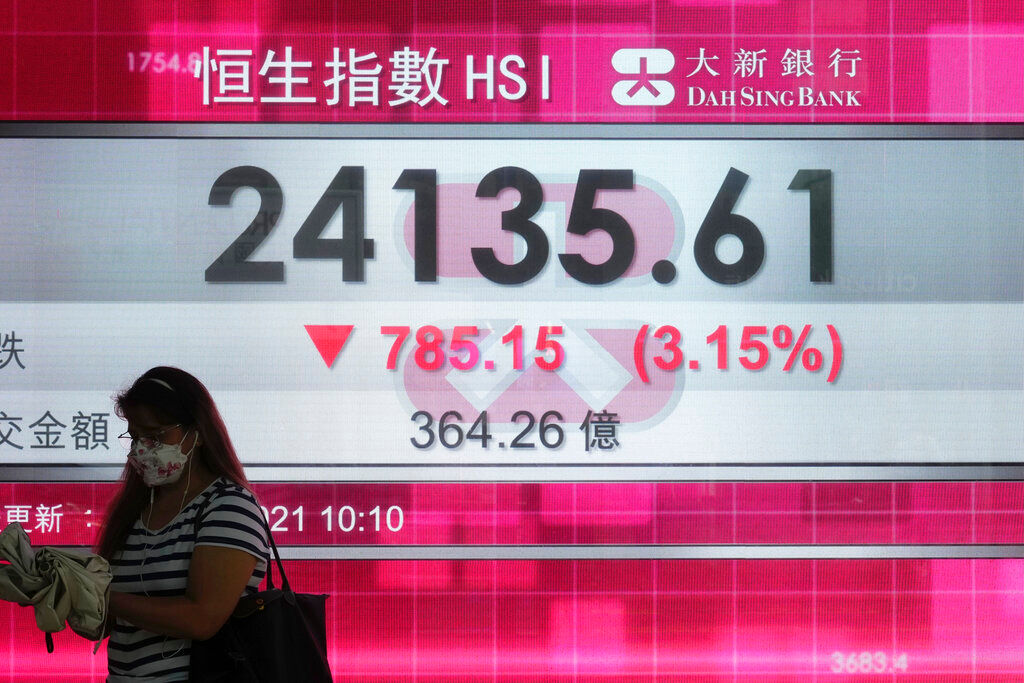Stocks slumped on Wall Street Monday, mirroring losses overseas and putting the S&P 500 index on track for its biggest drop since May.
Worries about debt-engorged Chinese property developers — and the damage they could do to investors worldwide if they default — are rippling across markets. Investors are also concerned that the US Federal Reserve could signal this week that it’s planning to pull back some of the support measures it’s been giving markets and the economy.
Also read: 10 years of Occupy Wall Street movement: How was it effective?
The worries over Chinese property developers and debt have recently centered on Evergrande, one of China’s biggest real estate developers, which looks like it may be unable to repay its debts.
The fear is that a potential collapse there could send a chain reaction through the Chinese property-development industry and spill over into the broader financial system, similar to how the failure of Lehman Brothers inflamed the 2008 financial crisis and Great Recession. Those property companies have been big drivers of the Chinese economy, which is the world’s second-largest.
Also read: How true were US President Joe Biden’s claims on jobs, gasoline?
Here is a timeline of events leading to its debt crisis and what the firm has done to raise funds so far:
August 2017
Evergrande in 2017 said that it aims to slash its net gearing ratio to 70% by June 2020 from 240% in June 2017.
November 2018
Evergrande, in a central bank report, was named as one of the financial holding conglomerates that could cause systemic risk.
March 2020
The company cuts its debt by 150 billion yuan ($23.17 billion) annually for three years.
August 2020
Evergrande officials meet regulators in Beijing to introduce caps. The Chinese company sells 28% of its property management unit for $3 billion in a pre-IPO deal.
Also read: Pressure mounts on global leaders for climate change action
September 2020
Evergrande offers 30% discount on properties for a month to push sales.
October 2020
Evergrande raises $555 million in a secondary share sale.
November 2020
The company terminates the Shenzhen backdoor listing plan. It announces an agreement with strategic investors not to demand repayment.
Evergrande’s Property Services Group’s (6666.HK) Hong Kong IPO raises $1.8 billion.
January 2021
Electric vehicle unit China Evergrande New Energy Vehicle (0708.HK) raises $3.4 billion by bringing in six new investors.
March 2021
The Chinese giant sells 10% of its online real estate and automobile marketplace Fangchebao for $2.10 billion.
June 2021
Evergrande says it will sell over half of its 58% stake in smaller peer Calxon (000918.SZ), worth $386 million.
July 2021
Evergrande’s 132 million yuan bank deposit held at the request of China Guangfa Bank.
August 2021
Evergrande agrees to sell stakes in its internet unit HengTen Networks Group Ltd (0136.HK) worth a total of HK$3.25 billion.
If Evergrande fail to make good on their debts, the heavy losses taken by investors who hold their bonds would raise worries about their financial strength. Those bondholders could also be forced to sell other, unrelated investments to raise cash, which could hurt prices in seemingly unrelated markets. It’s a product of how tightly connected global markets have become, and it’s a concept the financial world calls “contagion.”
With inputs from the Associated Press







